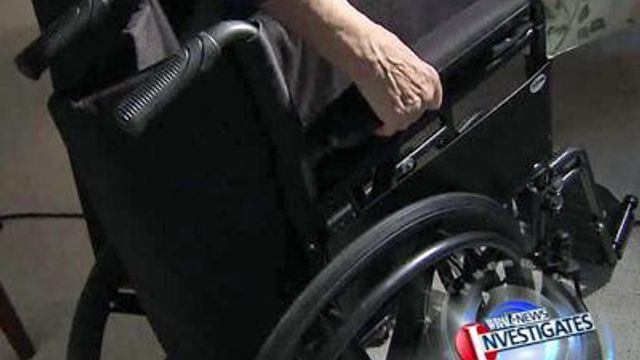Medicare spokesman: 'We're overpaying' for medical supplies
If a wheelchair costs $160, why would Medicare pay eight times as much? That's the question one local woman asked after her elderly father needed a wheelchair to get around. As a WRAL investigation found, it's all in the way Congress set up the spending plan.
Posted — UpdatedAs a WRAL investigation found, it’s all in the way Congress set up the spending plan.
A wheelchair seemed like a simple purchase for Jeanne Gunter's 95-year old-father when he moved to assisted living, but she soon learned that Medicare's payment system is not so simple.
Medicare rents to own equipment, such as wheelchairs. One wheelchair, for example, costs $104 a month for up to 13 months, which is about $1,300 total. Providers must maintain the liability to repair the chair during the 13 months of rental.
“We could’ve bought a wheelchair,” Gunter said. “I looked at a local pharmacy and looked at a wholesale club, and you could easily get one for $150 to $200 comparable to what we have.”
Laurence Wilson, director at Centers for Medicare and Medicaid Services, said he thinks Medicare is "overpaying substantially for wheelchairs."
Wilson said he blames medical supply companies and their powerful lobbies for allowing $1,300 wheelchairs. The rent-to-own plan started with the idea that some people only need equipment for a short time. Still, at those wheelchair prices, Medicare only breaks even if a patient needs a wheelchair for a month or two.
Medicare has a rent-to-own policy for most durable medical supplies, such as hospital beds, CPAP machines for sleep apnea and power wheelchairs.
WRAL News found audits by the Office of the Inspector General that specifically target power wheelchairs and overspending in that category.
According to a 2007 report, Medicare fee schedule amounts for power wheelchairs were 45 percent higher than median Internet prices available to consumers in the first quarter of 2007.
A 2009 report also made note that Medicare allowed an average of $4,018 for standard power wheelchairs that cost suppliers an average of $1,048 in the first half of 2007.
Between 1999 and 2003, Medicare payments for power wheelchairs increased approximately 350 percent, from $259 million to $1.2 billion, while overall Medicare program expenditures rose 28 percent, according to a 2009 report.
The agency said Congress set up the current rent-to-own process and how the monthly rent is calculated.
“In my opinion, the major problem is that Medicare needs to be paying a fair price, and we’re not getting a fair price now,” Wilson said.
After many phone calls, Gunter got her father's assisted living facility to cut the Medicare payments after three months, because she said it just wasn't right.
“How can we get it to Congress and get some changes made?” she asked.
Medicare started competitive bidding in January on some products to try to save money. Wilson says they have saved 35 percent on power wheelchairs so far. However, manual wheelchairs still aren't part of those changes.
Until then, Gunter said she wonders how many more $1,300 wheelchairs will be purchased.
The competitive bid process is being tested in a few cities, including Charlotte, and there is controversy surrounding it. Since medical supply companies have to win a contract, some Medicare patients say the program limits the companies from which they can choose.
A spokeswoman for the North Carolina Association for Medical Equipment Services did not want to comment specifically about Medicare policy.
• Credits
Copyright 2024 by Capitol Broadcasting Company. All rights reserved. This material may not be published, broadcast, rewritten or redistributed.






